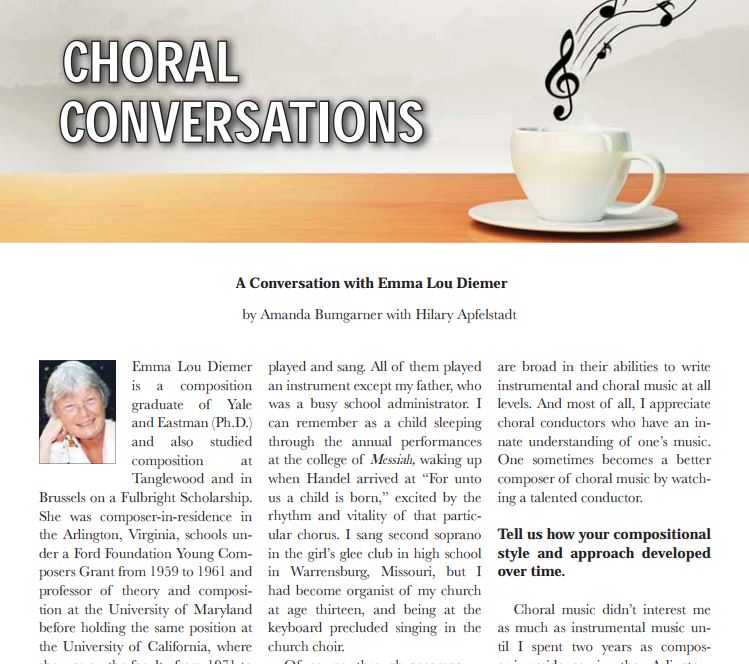
_____________________________
Choral Journal’s ongoing column called Choral Conversations” features interviews with noted choral conductors and composers. The second interview in this series took place with Emma Lou Diemer in the May 2019 issue.
You can read the interview in its entirety online at acda.org/choraljournal. Click “Search Archives” and choose May 2019 from the dropdown menu.
_____________________________
How do you select texts for your choral works?
I look for texts that are not wordy, not “preachy,” not burdened by overly weighty thoughts that do not need to be set to music. I like poems about nature, love, joy, praise, remembrance, sadness, texts that have rhythm, imagery, sometimes humor. Brevity is an asset because words/phrases can be repeated. (Some of us have written works using just the word “Hallelujah!) Emily Dickinson is a favorite of composers perhaps because of her brevity and depth and quantity. The lightness and rhythm of Renaissance poets is enticing.
When looking through sources I find that the first line is the most important, and that ensuing ideas/images need to be striking, moving. A text becomes more vivid and understandable as one sets it to music and finds inspiration in the sounds of certain words and their meaning. In a recent work written for the Huntsville (AL) Master Chorale, the poet at the time of the writing of the poem was ten years old, and she had won first place in a Young Writers contest. Her poem, “My Apple Orchard” has a fl ow that poems must have and an innovative use of punctuation: “Inside my orchard, summer green. Quiet. Gentle. Still. Serene…Lush grass shadowed by bushes…” I found the word “shadowed” especially conducive to repetition and the pauses easy to set.
Never feel that composers are so interested in the music they are writing that the words have no importance. It is the sound of words that encourage the music. Of course, the Bible has some of the most beautiful texts in existence. I have set almost all the psalms either vocally or chorally or for instruments.
Looking back at your career, what impact, if any, did your gender have on your development?
This is a huge aspect. Women composers can readily be accepted as the writer of piano pieces for children, songs (especially pop songs that are popular, whether it is known that a woman composed them or not), perhaps short organ compositions. But women have written masses, symphonies, concertos, much of it neglected or of short life. I’m sure there was (and still is) a great deal of impact especially regarding publication and performance. Female composers may tend to be looked upon with suspicion by publishers and performers unless there is a women’s festival or a conscious effort and need/obligation to include music by women. However, women composers of music for film have become prominent and outstanding. I would not like to be labeled a “choral composer” or “organ composer,” etc., any more than men have liked to have those labels when they have written music in many kinds of mediums. My main interest is to write music, and it has been a great joy to do so for most of my ninety-one years.
_____________________________
Read the rest of this interview (and more!) in the May 2019 issue of Choral Journal.


Leave a Reply
You must be logged in to post a comment.